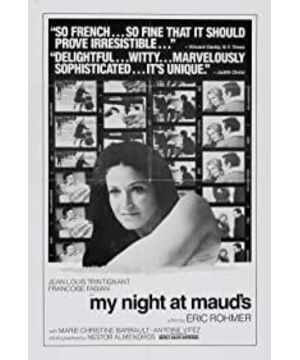Third chapter of Rohmer's SIX MORAL TALES, but released between the fourth (THE COLLECTOR) and the fifth (CLAIRE'S KNEE), MY NIGHT AT MAUD'S starring a saturnine Jean-Louis Trintignant as an engineer, also named Jean-Louis, after years of working abroad, he is relocated to work for the Michelin company in Clermont-Ferrand where he knows barely no one. Save for its epilogue takes place roughly 5 years after, the entire story is crimped during a Christmas break.
A devout Catholic bachelor at the mature age of 34, Jean-Louis spots a beautiful blonde girl Françoise (Barrault in her film debut, playing off against a well-articulated Trintignant with her own distinguished pauses and ambivalence), during a mass (where could be a more apposite place for a Catholic to meet his future wife?), and hit by coup de foudre, he affirms himself that she is the one for him. But before he is bestowed an opportunity to accost her on a snowy morning, a chance encounter with an old friend Vidal (Vitez) leads him to the apartment of an atheist divorcée Maud (Fabian), whom Vidal is courting and clearly hopes their relationship can progress into a deeper level.
But that only makes one of them, Maud, after she tactfully pre-empts Vidal's intention to stay over, by inviting an unwitting Jean-Louis to stay on the pretense of the danger of driving in heavy snow (and a false promise of an available guest bed), she admits that she and Vidal is a mis-match. To her, Jean-Louis is prioritized as a more interesting character, and albeit (or precisely because) the fissure apropos of their religions, her cunning invitation turns out more than a ploy to keep Vidal at bay, but more saliently, it escalates into a moral test to Jean-Louis' proclaimed celibacy as they have to share the same bed if he wants to survive a cold winter night, under Rohmer's economic supervision, their nimble-fingered yet sharp-tongued battle-of-sex becomes intriguingly titillating.
However, that appears just to be one layer on the surface, not until Rohmer mythically unfolds a key revelation right before the coda, which prompts us compulsively to rewind back and piece together all the minutiae in dribs and drabs through their private conversations, there is something more intricate and intrinsic in Maud's behavioral pattern, whether it is because Jean-Louis represents the type that cripples her first marriage, or she conducts her offensive with a whiff of personal vengeance, that is open for debate, yet, indubitably, she is a woman reveals considerably less than what she really thinks, and Françoise Fabian is so absorbing in Maud's sophisticate persona, which gives the character a more enduring glamor which one tends to overlook prima facie.
On the other hand, Jean-Louis is also not a nebbish greenhorn in the game of gender politics, especially played by a protean Trintignant who knows exactly when to clam up and when to wax lyrical about his belief, or Blaise Pascal. Rohmer's extraordinary wits hit its home run in Jean-Louis' apparent change of mind with Maud the morning after, even the latter seems to be mildly surprised and smitten by Jean-Louis' softened congeniality, but only himself and audience know the occasion, sometimes, a person takes a sudden shine to you, but the reason behind that can be totally irrelevant to you, and in Jean-Louis' case, he is merely happy to share his delight after cinching a date with the one he really desires, an act ironically is actuated by the night's experience at Maud's, it is a paradigm of Rohmer when he is most instructively sharp-minded,a master chamber piece radiated in sheer black-and-white luster.
referential entries: Rohmer's CLAIRE'S KNEE (1970, 8.5/10), THE COLLECTOR (1967, 6.1/10), PAULINE AT THE BEACH (1983, 7.7/10).
View more about My Night at Maud's reviews










